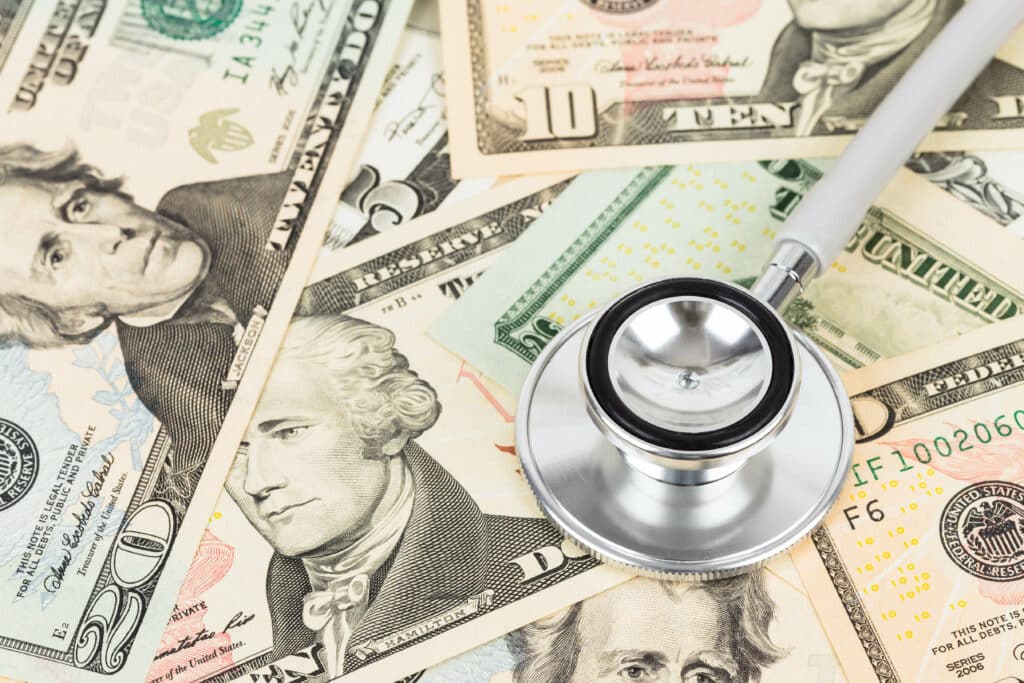Taking time to routinely evaluate the health of your finances can go a long way toward gaining financial security.
In a world where prices of goods are skyrocketing and bills are steadily rising, it’s an important skill to learn how to assess financial health. You should implement scheduled evaluations of your finances, just as you’d visit a medical professional for regular health checkups. Many experts suggest finance checkups about once a year to preserve your overall financial health.
With or without observable financial risk, it’s important for you to constantly determine the state of your finances. While it may seem like a daunting task, doing this makes sure that potential complications in your personal expenses are mitigated immediately as they arise. Read on to discover tips on how to measure your own financial health.
What Is Financial Health?
Simply put, financial health refers to the general state of your monetary situation. This involves personal debt, retirement planning, income and expenditure, and many other assets. Many experts differ on how they choose to measure financial health, so you must assess your own situation and financial needs in a way that suits you.
Importance of Evaluating Financial Health
Evaluating financial health is an important skill for several reasons. Good financial health allows you to achieve your financial needs and prepare for any unexpected emergencies that may arise along the way. Individuals that possess good financial health display resiliency without the need to worry about cash on an everyday basis.
On the other hand, having poor financial health, which can involve having a low credit score and possessing little to no savings, can put both you and those who financially depend on you at risk.
Key Factors in Assessing Financial Health
Several key factors come into play with financial sustainability. First, you must pay good attention to your credit, as this can give you the opportunity to acquire loans when needed. A sufficient credit score is a significant indicator of financial health. Next, you must reduce the amount of debt you rack up. Having loans that exceed personal income can spiral into negative consequences in the long run. You must also have long-term emergency savings to achieve important financial goals. Finally, good insurance coverage ensures that you can prepare for medical expenses and personal accidents in the future.
5 Tips for Evaluating Financial Health
Your finances can be a significant deal breaker. Thus, knowing how you fare in terms of your budget is important to your financial growth and development. These are five important steps you can take to critically assess your financial health.
1. Observing Your Debt
First, you should assess whether you are handling debts successfully and on time. These debts may include credit card payments and student loans. A good metric is your debt-to-income ratio; this is a comparison of your monthly obligations to your income. The recommended value by lenders and experts is no greater than 30 percent.
Paying back an increasing amount of debt is important — the debt-to-income ratio is key in determining a credit score. You must frequently assess your finances and learn how to mitigate spending to reduce overall balances. Also, consider your present interest rates. Refinancing loans or switching credit cards may help you save money.
2. Creating or Updating Your Budget
As a consumer, you need to be aware of how you’re spending your money. A budget streamlines the process of making adjustments to financial expenses depending on needs or income changes. You will be able to strategize your financial goals based on cash flow rates and expenditures.
Creating a budget is simple — all you need is to first assess your income, then tabulate recurring payments and variable expenses. You can update your personal spreadsheets by frequently accessing your balance on banking and credit card websites. This will make sure that you avoid spending more money as your income grows.
3. Evaluating Investments for Future Emergencies
Make sure that you build an emergency fund (ideally, about three to six months’ worth of expenses) for use in future emergencies. Furthermore, you should have sufficient insurance coverage that matches life events and future goals.
Failing to be insured can come at the expense of significant financial loss. To avoid dismantling a stable financial plan, you should research more about ways to save on insurance. Changing insurance companies or combining policies may allow you to have a big boost in your financial health.
4. Regularly Check Your Credit Report
You need a good credit score for a lot of things, from taking out a loan to renting a house or apartment. It’s a good idea to always keep an eye on your score to ensure it’s where you want it to be or to gain insight into what you could be doing better to improve it. Websites like Experian and Equifax enable you to check your score for free. If you’re disappointed in the number, there are several things you can do, such as paying off old debts as best as possible, paying bills on time, and so on.
Knowing your score also gives you an idea as to what types of credit you can qualify for.
5. Finalizing and Reviewing a Suitable Estate Plan
Estate plans determine where your assets will be channeled when you pass away. You must be confident about who to choose as executors or trustees in your will. Determine whether they are capable of carrying out what you want to happen with your financial assets.
However, if you have still yet to make an estate plan, it is suggested that you begin drafting a document and consider who to place as beneficiaries. Estate plans help prevent time-consuming hassles that may arise in the future for your loved ones.
Conclusion
Assessing your financial health is important to ensure that you are on the pathway to attaining your financial goals. Evaluating debt, creating a budget, preserving emergency investments, checking your credit score, and reviewing estate plans all help in minimizing long-term difficulties. There’s no need to rush in making adjustments to your finances after a thorough evaluation — gradual changes after regular assessments will be the key to overall stability.

Finny the Finance Bot says…
How can I evaluate the health of my finances?
Here are some ways to evaluate the health of your finances:
- Review your budget: Look at your monthly income and expenses and make sure you’re spending less than you earn. A balanced budget is a sign of good financial health.
- Check your debt: Look at your credit card balances, personal loans, and other debt. A high level of debt can indicate poor financial health and limit your ability to save and invest.
- Track your savings: Evaluate your progress towards building an emergency fund and saving for long-term goals, such as retirement. A solid savings plan is a key component of good financial health.
- Assess your investments: Review the performance of your investments and make sure they are aligned with your goals and risk tolerance.
- Monitor your credit: Review your credit report regularly to ensure accuracy and identify any areas for improvement, such as paying bills on time and reducing debt.
- Seek financial advice: Consider working with a financial advisor to help you assess your financial health and develop a plan to reach your goals.
- Evaluate insurance coverage: Make sure you have the right amount and type of insurance coverage for your needs, including health, life, and property insurance.
- Plan for retirement: Evaluate your progress towards retirement savings and consider your expected income in retirement and your desired lifestyle.
Remember, the key to evaluating the health of your finances is regularly monitoring your progress and taking action to improve areas that need attention. A healthy financial situation is not achieved overnight but through ongoing effort and planning.
The author generated Finny the Finance Bot’s text in part with GPT-3, OpenAI’s large-scale language-generation model. Upon generating draft language, the author reviewed, edited, and revised the language to their own liking and takes ultimate responsibility for the content of this publication.








